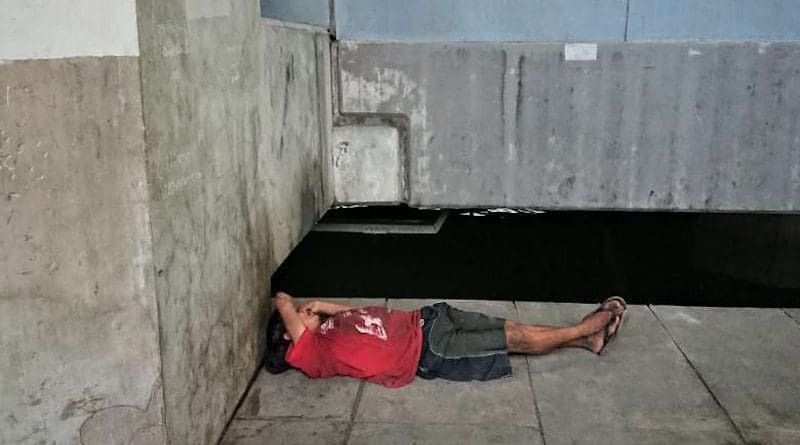Thailand: Millions Fall On Hard Times
By UCA News
Siriwan Wongprasong, a Thai woman in her late 50s, has never had it particularly easy, but times are especially hard these days, she says.
Reserved and soft-spoken, Siriwan lives in an inner-city shanty town in an otherwise affluent part of Bangkok. Her husband is ailing, so she is the family’s only breadwinner and makes her living by mending clothes on a portable sewing machine she sets up daily on a sidewalk beside a five-star hotel.
This time last year she earned around 500-600 baht (US$17-20) a day, but nowadays she routinely makes only a fraction of that.
“Sometimes I don’t feel like coming to work at all, but I need to try and make some money,” she laments. “Otherwise, I don’t know what will happen to us.”
Siriwan rarely gets any costumers anymore, she says, as most locals are less inclined to use her services in a bid to save money.
At the same time, with Thailand’s borders largely closed to foreign visitors, there are no tourists who would want her to hem their newly bought pairs of pants or sew up holes in well-worn travel attire.
The seamstress indicates her stomach. “I am going hungry,” she says. “I don’t know how much longer I can go on like this. I just don’t know.”
As the Covid-19 pandemic has devastated Thailand’s economy, millions of people like Siriwan have fallen on hard times. While they could once earn a decent enough income, they are finding it a lot harder to make ends meet.
Without any social benefits from their government in a country with no safety net for most poor people, many low-income and even middle-class Thais are increasingly in debt. According to a new survey conducted by YouGov, a London-based market research company, eight out of 10 Thais are in debt and low-income locals have especially been hard hit financially because of the ongoing pandemic.
Some 40 percent of the more than 2,000 respondents in the survey said they have borrowed extra money this year in order to try and stay afloat financially. Many of them have done so from loan sharks who charge usurious interest of up to 50 percent on loans, which ensures that their clients will remain in debt for longer periods unless they can somehow find a way to pay the money back.
The likely result for millions of Thais trying to make ends meet will be a downward spiral of increasing debt and growing poverty in the coming months as the economy continues to stagnate.
“[Low-income members] of the population with no savings and high debt are already vulnerable, but with Covid they’re now trapped in a hole of debt,” warns Nonarit Bisonyabut, an expert at the Thai Development Research Institute.
Despite the bleak outlook, Thailand’s military-allied government has done little to alleviate the financial woes of the country’s most vulnerable citizens apart from some smaller monetary handouts earlier this year.
“Poor people like us are on our own,” says a street vendor who sells iced coconut juice for a living from his cart on a busy street in central Bangkok. “Officials don’t care about us. We don’t matter to them.”
Even before the pandemic, more and more low-income Thais were sliding back into poverty in a country that is one of the world’s most economically unequal nations with a staggering wealth gap between rich and poor.
According to a recent Credit Suisse Global Wealth Report, the richest 1 percent of Thais, or some half a million people, control two-thirds of the wealth in a nation of 70 million. That rate of inequality is far higher than that in other notoriously unequal countries like Russia (57 percent) and India (51.5 percent).
Even as the richest Thais have got richer, there are more poor Thais than ever in recent years despite decades-long poverty reduction measures in one of Southeast Asia’s largest economies.
“Thailand has successfully reduced poverty over the past three decades from over 65 percent in 1988 to under 10 percent in 2018. However, the growth of household incomes and consumption growth both have stalled nationwide in recent years,” the World Bank explains.
“This resulted in a reversal in the progress of poverty reduction in Thailand with the number of people living in poverty rising. Between 2015 and 2018, the poverty rate in Thailand increased from 7.2 percent to 9.8 percent, and the absolute number of people living in poverty rose from 4.85 million to more than 6.7 million.”
The figures cited by the World Bank referred to the pre-pandemic state of affairs and the poverty rate has since likely increased even further, experts say.
Signs of extreme poverty are commonplace around Bangkok and provincial towns, with numerous locals sleeping rough on streets. Many others still have roofs over their heads but are languishing without steady incomes on the verge of even more financial hardship.
Near the spot where Siriwan operates her sewing machine lies a man in tattered old clothes. He is sleeping soundly on a sidewalk despite the din of afternoon traffic on a busy road right beside him.
For many of the poorest Thais with no possessions to call their own, sleeping rough is the end of the road and no help is in sight save for a few baht passed occasionally to them by charitable passersby.

